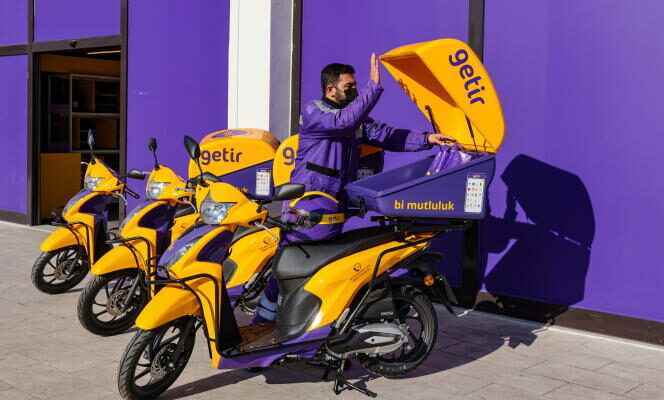“Young dad without pay. » This is how Sami introduces himself (all the first names have been changed), delivery man at Getir, one of the start-ups that deliver groceries to homes in a few minutes. He is currently serving a period of notice of dismissal for misconduct. “Getir blamed me for ten ten-minute delays over three months!he explains. However, I have always warned my managers of my delays, I have proof of this. » He who is “very involved” in his work, which “went up[t] packs of water ten or fifteen times a day”disillusioned.
A company of Turkish origin, Getir is one, along with the German delivery companies Flink and Gorillas, or even the American Gopuff, of the ten or so players in this “quick trade” which rolled into France in 2021 to make ultra-fast deliveries to from their small urban warehouses, the “dark stores”. They are surfing on the home delivery boom, which developed during the confinements due to Covid-19, in 2020 and 2021.
Their hallmark: hire delivery people on permanent contracts (CDI) to socially stand out from food delivery platforms that resort to the precarious, even misguided, status of autoentrepreneur.
Hiring thousands of employees, these companies were nurtured by “Extraordinary fundraising throughout 2021”, underlines Matthieu Vincent, co-founder of the consulting firm DigitalFoodLab. Gorillas raised $1 billion (€983 million) in October 2021, Flink $750 million in December 2021, and Getir $800 million in March.
“There are too many actors”
But many have already disappeared, a few months after appearing, such as the company of Russian origin Yango Deli-Yandex, deprived of Russian financing, or the British Zapp or Dija, bought by Gopuff in August 2021. Indeed, since the beginning of the year, in an inflationary economic context linked to the war in Ukraine, which began on February 24, investors “are more cautious, they have doubts about the ability to create a profitable model in the long term”, believes Matthieu Vincent. Especially since these “quick traders” make massive use of promotions, supposed to stimulate the act of purchase.
“In Paris, 70% of orders are sponsored by the delivery company, which is huge”observes this expert. Today, “there are too many actors”he notes, which partly explains the job cuts. “Many of the layoffs are also linked to a stoppage or a break in the financing which affects all these start-ups., he specifies. For investors, it is now necessary to seek profitability very quickly. However, most of these companies are not profitable and know that they will find it difficult to find financing under favorable conditions. »
You have 50.27% of this article left to read. The following is for subscribers only.
